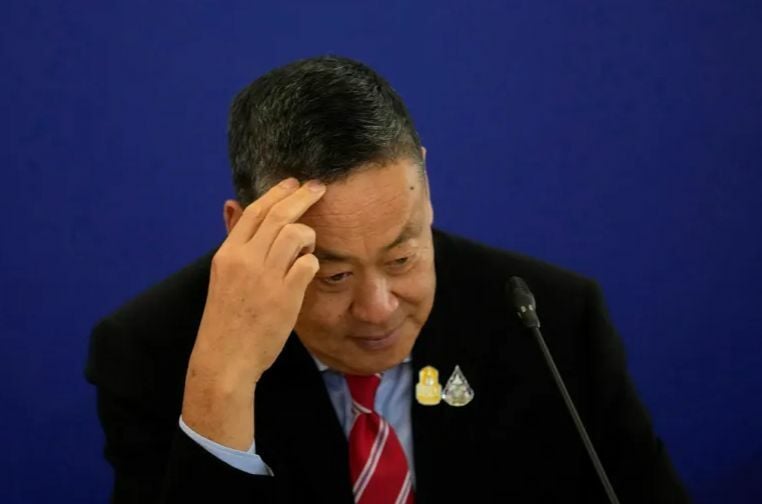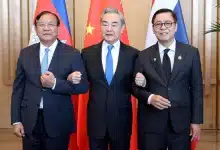Impending impacts of upcoming court rulings on Srettha and MFP

Thailand’s political landscape is set for a significant shift as the upcoming Constitutional Court ruling on the cases of Prime Minister Srettha Thavisin and the opposition Move Forward Party (MFP) leader next month.
The outcomes, scheduled for July 3 for the MFP and July 10 for PM Srettha, have the business community on edge, worried about potential disruptions to the economy if the current administration is affected by the court rulings.
The Bangkok-born prime minister faces an ethics probe linked to his appointment of Pichit Chuenban as PM’s Office Minister after a controversial Cabinet reshuffle. Pichit resigned just before the Constitutional Court decided to proceed with the ethics investigation.
In 2008, Pichit was sentenced to six months in prison for attempting to bribe Supreme Court officials with a paper bag containing 2 million baht.
An independent analyst on international economics, Aat Pisanwanich described Thailand’s political situation as highly uncertain. He indicated that any political change might lead to a new coalition government excluding the Pheu Thai Party, which currently holds the most seats in Parliament.
If PM Srettha is found guilty of violating ethics regulations due to Pichit’s appointment, he might be pressured to resign. Aat identified three potential successors: Paetongtarn Shinawatra, Chaikasem Nitisiri, and Bhumjaithai Party leader Anutin Charnvirakul.
Potential successors
“If Paetongtarn is chosen, there may be questions about her knowledge and capabilities, affecting already weak confidence in the government.”
The reduced public confidence in the government stems from Pheu Thai Party’s alliance with the previous coalition, sidelining the MFP despite its election victory. Aat noted that several government projects, including the Land Bridge, soft power initiatives, and the digital wallet handout, have yet to produce tangible outcomes.
Rising production costs have also heightened the cost of living, making Thailand one of the most expensive countries in Southeast Asia. Aat suggested that a reduction in the policy interest rate, long supported by the prime minister’s government, could ease the burden on debtors and stimulate domestic investment.
However, the Bank of Thailand remains hesitant due to ongoing growth in domestic consumption, despite public sentiment indicating otherwise. Aat further comments on the current state of Thailand’s economy.
“The rise in consumption is from a low base during the pandemic, making this growth appear illusory,
“Thai inflation rates are relatively low, which do not align with rising oil prices. Oil prices are a crucial production cost, causing overall production costs to rise, even though inflation does not correspondingly increase.”
Government stability
Vice-Chairman of the Thai Chamber of Commerce, Visit Limlurcha emphasised the need for government stability to maintain investor confidence and attract foreign direct investment. Visit highlighted the importance of adjusting the production structure, improving competitiveness, and driving economic growth.
“The private sector and government need to collaborate to foster an economic recovery. In the short term, companies want state budget disbursement to be accelerated.”
Chairman of the Thai National Shippers’ Council, Chaichan Chareonsuk echoed calls for stability, noting that exporters face global uncertainties, such as geopolitical tensions in the Middle East, which increase freight costs and could escalate into a trade war.
“If Thailand’s political situation is stable, it will expedite strategic and budget planning for 2025.”
The uncertain future of the 62 year old PM, who has been actively promoting foreign investment, has manufacturing operators concerned about investment prospects and the continuation of economic policies. The Thai premier’s potential dismissal could lead to political instability, causing investors to delay or halt their decisions.
The Chairman of the Federation of Thai Industries (FTI), voiced concerns over possible effects of the court rulings, especially in the case of a possible dismissal of the prime minister.
Impacts on investors
“A change to his premiership will worry foreign investors, resulting in halts or delays to their decisions to invest in Thailand.”
Similar political uncertainty emerged last year when former MFP leader Pita Limjaroenrat failed to secure sufficient parliamentary support to become prime minister despite winning the most votes in the May 14 General Election. This unclear timeline for forming a new government dented business confidence.
Political instability contributed to the Thai Industries Sentiment Index (TISI) decreasing to 92.3 points in July last year, the lowest in ten months, according to a survey of 1,329 entrepreneurs across 46 industries under the FTI. The index continued to fall this month to 88.5 points, with 15,000 workers losing their jobs this year.
High levels of household debt are causing banks to tighten lending criteria, affecting businesses such as car manufacturing. Chief Executive of PTT Global Chemical, Narongsak Jivakanun expressed hope that the government will maintain the manufacturing sector’s stability despite political issues, especially after the court ruling.
“Thailand is a hub of internal combustion engine cars and some electronic products. We believe the government will manage to keep this status regardless of political problems.”
President of the Association of Thai Travel Agents, Sisdivachr Cheewarattanaporn, warned that political instability could significantly impact the economy, especially the tourism sector.
Effects on tourism
He noted concerns from overseas partners, particularly in China, over the situation, before advocating for more proactive government communication to promote safe tourism and potential destinations in Thailand.
“It is necessary to prioritise economic and tourism confidence.
“If political tension escalates, it is the duty of all sectors to save the tourism industry by ensuring tourists the industry will remain intact.”
Sisdivachr suggested that the government should accelerate the market with visa-free programmes, airport development, and promotion of second-tier cities. He also emphasised the importance of listening to the private sector for effective policy planning, reported Bangkok Post.
Latest Thailand News
Follow The Thaiger on Google News:


























